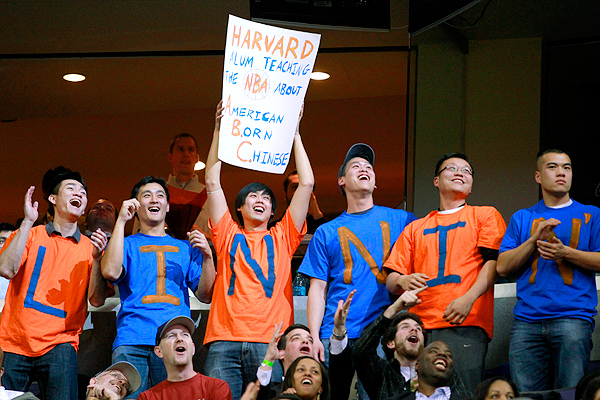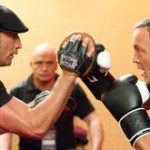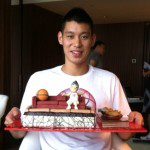My recent post on NBA insta-celebrity Jeremy Lin — “Jeremy Lin and the Soft Bigotry of Low Expectations” — garnered a fair amount of controversy. To supply some backstory: shortly after Jeremy’s outstanding off-the-bench performance against the New Jersey Nets, a friend forwarded the video highlights to me with a note that some of her Asian-American male friends were deeply moved at the sight of someone “like them” succeeding on the highest stage against the mega-athletes of the NBA. I watched the video and sent a note back: “Love the video. Wish the commentators weren’t talking about him like he’s some kind of kid.” My friend responded that she felt the same way — and that many of her Asian-American friends also felt the commentators were (unintentionally) demeaning.
The concern of my post was not to allege that the commentators were racist. In fact, I explicitly said that I thought they were not. But I did say that I thought the commentators’ words were consistent with a pattern of “low expectations” over the course of Jeremy’s career so far that seemed to stem from ethnic stereotypes. Jeremy has been consistently overlooked and underestimated, in other words, because people simply don’t expect an Asian-American to succeed in a sport like basketball — especially one who’s relatively small (though in the average range for a Point Guard) and has to get by on speed, strength, guts and guile.
Many readers agreed with my assessment. Others did not — and I was fairly roasted for suggesting the commentators were guilty of “soft bigotry.” Of course, what’s so insidious about the soft bigotry of low expectations — which expresses itself by not expecting or demanding the highest levels of success from people who belong to a particular group — is that it looks like kindness.
 The truth is that I cannot know what took place in the hearts and minds of the commentators — and neither can those who disagree with me. It would have been more charitable for me to assume the best of them. But this assumes that I thought poorly of them. I really don’t think ill of the commentators. I just think they belong to a culture (we all do; it’s our culture) that expects Asian-American males to succeed in some things and not in others, to perform well in some sports and not in others. I spent some time thinking this over when I thought I was going to have a son. He would be half-Chinese, and he would face a veritable armada of stereotypes. On his behalf, I would be grateful for a courageous young man like Jeremy Lin who doesn’t fold his arms and resent the stereotypes but goes out onto the court day after day and explodes the stereotypes by achieving success in an arena where he’s not supposed to.
The truth is that I cannot know what took place in the hearts and minds of the commentators — and neither can those who disagree with me. It would have been more charitable for me to assume the best of them. But this assumes that I thought poorly of them. I really don’t think ill of the commentators. I just think they belong to a culture (we all do; it’s our culture) that expects Asian-American males to succeed in some things and not in others, to perform well in some sports and not in others. I spent some time thinking this over when I thought I was going to have a son. He would be half-Chinese, and he would face a veritable armada of stereotypes. On his behalf, I would be grateful for a courageous young man like Jeremy Lin who doesn’t fold his arms and resent the stereotypes but goes out onto the court day after day and explodes the stereotypes by achieving success in an arena where he’s not supposed to.
And that’s the point. That’s what the post was about: Why Jeremy Lin matters to the Asian-American male.
Now let me turn to new territory. After my interview with Jeremy in March 2010 — when he was a student and I was a Teaching Fellow at Harvard — we kept in touch. I had been an elite gymnast whose spiritual life had been fundamental to his athletic life. He was too. I interviewed Michael Chang (and Michael had taken Jeremy under his wing), was friends with the young pastor who mentored Jeremy, and I sent Jeremy some followup questions after he made it onto the Golden State Warriors.
I never published the Q&A. I was holding onto it until I found the right angle or occasion — and the right time never arose. So what follows are the questions and answers with Jeremy in August 2010. To review: Jeremy had taken part in the NBA Summer League in 2010 and performed well against top draftee John Wall, well enough to be signed by the Golden State Warriors in July. I wrote Jeremy the next month, and he was kind enough to respond.
What stands out to me is that Jeremy is a person of great courage and determination, a young man who speaks of his faith unabashedly but is not out to self-promote. He doesn’t go on at great length or depict himself as a the protagonist in a faith-hero story. In the midst of some ups and downs, his trust in God is strong and grounded. Since Jeremy has now spread Linsanity from coast to coast, I offer this Q&A for posterity’s sake, as a glimpse into his spirit as he was struggling to find his way into the NBA. This is a part of why Jeremy matters. He is not only an extraordinary basketball player, and not only an Asian-American, but an impassioned believer who will use the platform God has given him for the good.
DALRYMPLE: What was your reaction when you were not selected in the draft? Was it discouraging or difficult to keep the faith?
LIN: It was very disappointing. But I tried to keep my head up and stay faithful. In so many instances in my life, God has turned what seemed to be “bad” situations into great ones.
Yet God provided a way for you into the NBA — and perhaps a better way — through the summer league. Do you have any notion of why God took you through this particular process, rather than having you drafted?
I can’t say exactly why God had me take the path I took, but I know that He has more than revealed His power and sovereignty to me throughout this incredible process.
You opened a lot of eyes when you were up against John Wall. Did you realize that that particular game was a great opportunity for you? Was it one of those games where you felt a tangible encouragement and strengthening from the Spirit?
I knew that the Wizards game was the best opportunity for me to showcase myself. I definitely felt like God was guiding me and enabling me throughout the game.
In the end, according to reports, you were courted by the Los Angeles Lakers and the Golden State Warriors. On the one hand the world champions, and on the other hand the hometown team. How’d you decide between them?
I chose the Warriors because of four main reasons: the location, the terms of the contract, roster space for a player like me, and style of play.
What do you need to do now in order to establish a solid footing in the NBA? Will it help or hurt to be near family and friends?
I have to stay disciplined and consistent with my devotionals and fellowship. I am going to be discipled by my pastor from my home church — and will attend my home church. That will help out a lot.
How will you strive to use the platform that God has given you?
I have a heart for inner city ministry and nonprofit work. So I’m learning and praying about what exactly that means. I’m just trying to learn a lot and be sensitive to God so that I can expand his kingdom as much as possible.











